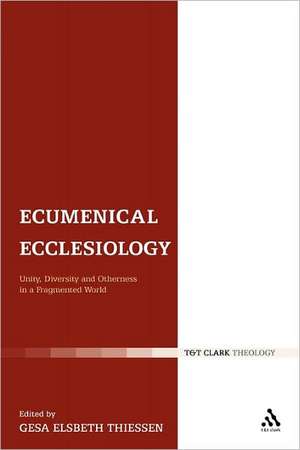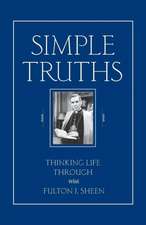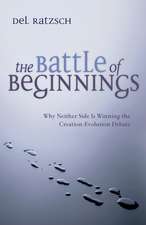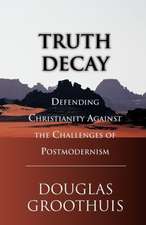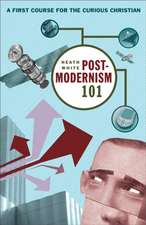Ecumenical Ecclesiology: Unity, Diversity and Otherness in a Fragmented World: Ecclesiological Investigations
Editat de Dr Gesa Elsbeth Thiessenen Limba Engleză Paperback – 23 feb 2011
| Toate formatele și edițiile | Preț | Express |
|---|---|---|
| Paperback (1) | 257.68 lei 6-8 săpt. | |
| Bloomsbury Publishing – 23 feb 2011 | 257.68 lei 6-8 săpt. | |
| Hardback (1) | 891.10 lei 6-8 săpt. | |
| Bloomsbury Publishing – 14 sep 2009 | 891.10 lei 6-8 săpt. |
Din seria Ecclesiological Investigations
- 22%
 Preț: 949.17 lei
Preț: 949.17 lei - 22%
 Preț: 888.81 lei
Preț: 888.81 lei - 22%
 Preț: 948.75 lei
Preț: 948.75 lei -
 Preț: 256.49 lei
Preț: 256.49 lei -
 Preț: 256.77 lei
Preț: 256.77 lei - 23%
 Preț: 255.29 lei
Preț: 255.29 lei - 14%
 Preț: 192.73 lei
Preț: 192.73 lei - 13%
 Preț: 258.77 lei
Preț: 258.77 lei - 22%
 Preț: 257.68 lei
Preț: 257.68 lei - 22%
 Preț: 257.12 lei
Preț: 257.12 lei - 14%
 Preț: 196.17 lei
Preț: 196.17 lei - 13%
 Preț: 257.32 lei
Preț: 257.32 lei - 22%
 Preț: 257.50 lei
Preț: 257.50 lei - 23%
 Preț: 255.66 lei
Preț: 255.66 lei -
 Preț: 257.86 lei
Preț: 257.86 lei - 13%
 Preț: 258.69 lei
Preț: 258.69 lei - 22%
 Preț: 238.11 lei
Preț: 238.11 lei - 22%
 Preț: 239.02 lei
Preț: 239.02 lei - 22%
 Preț: 239.85 lei
Preț: 239.85 lei -
 Preț: 256.59 lei
Preț: 256.59 lei - 22%
 Preț: 259.34 lei
Preț: 259.34 lei -
 Preț: 257.97 lei
Preț: 257.97 lei
Preț: 257.68 lei
Nou
Puncte Express: 387
Preț estimativ în valută:
49.31€ • 50.94$ • 41.04£
49.31€ • 50.94$ • 41.04£
Carte tipărită la comandă
Livrare economică 25 martie-08 aprilie
Preluare comenzi: 021 569.72.76
Specificații
ISBN-13: 9780567618344
ISBN-10: 056761834X
Pagini: 260
Dimensiuni: 156 x 234 x 14 mm
Greutate: 0.37 kg
Editura: Bloomsbury Publishing
Colecția T&T Clark
Seria Ecclesiological Investigations
Locul publicării:London, United Kingdom
ISBN-10: 056761834X
Pagini: 260
Dimensiuni: 156 x 234 x 14 mm
Greutate: 0.37 kg
Editura: Bloomsbury Publishing
Colecția T&T Clark
Seria Ecclesiological Investigations
Locul publicării:London, United Kingdom
Caracteristici
Addresses
some
of
the
fundamental
issues
in
contemporary
ecumenical
dialogue.
Notă biografică
Gesa
Thiessenis
a
lecturer
at
Milltown
Institute
of
Theology
and
Philosophy
in
Dublin
and
an
Honorary
Research
Fellow
at
the
Department
of
Theology
and
Religious
Studies
at
the
University
of
Wales,
Lampeter.
She
is
a
member
of
the
steering
group
of
the
Ecclesiological
Investigations
International
Research
Network.
Cuprins
Acknowledgements
Contributors
PrefaceLinda
HoganIntroductionGesa
E.
ThiessenPart
I:
Perspectives
on
Contemporary
Ecumenical
Ecclesiology1.
Driving
the
Haywain:
Where
Stands
the
Church
'catholic'
Today?Gerard
Mannion2.
Seeking
Unity:
Reflecting
on
Methods
in
Contemporary
Ecumenical
DialogueGesa
E.
Thiessen3.
The
Struggle
for
an
Organic,
Conciliar
and
Diverse
Church
-
Models
of
Church
Unity
in
Earlier
Stages
of
the
Ecumenical
DialogueMiriam
Haar4.
Church
and
Covenant:
Theological
Resources
for
Divided
DenominationsEdwin
C.
van
Driel5.
Comprehensive
Vision:
The
Ecumenical
Potential
of
a
Lost
IdealAndrew
Pierce6.
Integrity,
Alternative
Aggressions,
and
Impaired
CommunionWendy
DacksonPart
II:
Communion
Ecclesiology
and
Otherness7.
The
Church
and
the
'Other':
Questions
of
Ecclesial
and
Divine
CommunionPaul
M.
Collins8.
Being
Church:
A
Critique
of
Zizioulas'
Communion
EcclesiologyTravis
E.
Ables9.
Retrieving
Eucharistic
EcclesiologyRadu
Bordeianu10.
Communion
Ecclesiology
and
Ecumenical
Experience:
Resources
for
Inner-Denominational
OthernessBrian
P.
Flanagan11.
Evangelical
Ecclesiology
as
an
Answer
to
Ethnic
Impaired
Christian
Community?
An
Inquiry
into
the
Theology
of
Miroslav
VolfEddy
Van
der
BorghtPart
III:
Ecclesiology
in
Global
Contexts12.
On
Being
a
European
Catholic:
The
Politics
of
Inclusion
Encounters
an
Ecclesiology
of
ExclusionJulie
Clague13.
Instruments
of
Faith
and
Unity
in
Canon
Law:
The
Church
of
Nigeria
Constitutional
Revision
of
2005Evan
Kuehn14.
Sacral
Authority
and
Pastoral
Ministry:
A
Shamanistic
Inculturation
of
the
Protestant
Church
in
KoreaHak
Joon
Lee15.
Confucianism,
Internationalism,
Patriotism
and
Protestantism:
The
Ecclesiological
Matrix
of
Japanese
Christian
Activists
in
Japan
and
the
U.S.
DiasporaMadeline
DuntleyIndex
Recenzii
Guided
by
an
editor
at
once
theologically
critical
and
ecumenically
compassionate,
these
authors
follow
her
lead
in
bringing
historically
informed
theory
to
bear
on
the
contemporary
contexts
and
practices
of
ecclesial
bodies.
The
volume
delivers
what
the
best
of
such
collections
achieve:
a
range
of
provocative
questions
sure
to
incite
further
academic
inquiry
with
confidence
and
newfound
ecumenical
purpose.
Those with a serious interest in theology, but who think that ecumenism has become a boring and interminable debate among clerics, will be pleasantly surprised by this volume. It shows that internal divisions, especially in the Roman Catholic Church and the Anglican Communion, have now reached the stage of ecumenical problems in their own right, though in both cases the resources are there to tackle them. New light is shed on 'communion' ecclesiology in Orthodoxy and the sharp disagreements to which it gives rise. Running through these more classical themes are the tensions caused by gender, ethnicity and inculturation, with striking examples from Korea and Japan. Starting from the core notion of the ecumenical, the book exemplifies its relevance to a wide range of contemporary issues.
Ecumenical Ecclesiologyis a useful and insightful guide through the complex contemporary debate on how the church could be one without losing its many faces and particularities. It offers a rich variety of contributions from diverse denominational and cultural backgrounds committed to the re-evaluation of older models of ecumenism while sharing their desire for the church's celebration, witness and service in the world not to be disrupted by divisions.
The idea for the volume was kicked around at various international conferences on religion during the years leading up to the centenary of the 1910 World Missionary Conference, which is recognized as the birth of the modern ecumenical movement. Theologians from Europe and the US offer perspectives on contemporary ecumenical ecclesiology, communion ecclesiology and otherness, and ecclesiology in global contexts. Among their topics are reflecting on methods in contemporary ecumenical dialogues, theological resources for divided denominations, questions of ecclesial and divine communion, retrieving eucharistic ecclesiology, instruments of faith and unity in canon law in the Church of Nigeria constitutional revision of 2005, and the ecclesiological matrix of Japanese Christian activists in Japan and the US diaspora.
The essays vary widely in accessibility, style and scope, though the quality is high. They seek not to provide a single coherent perspective but to showcase the range of thinking from those who believe that serious study of ecclesiology can change the shape both of the Church's internal divisions and of its contribution to dangerously fragmented world. In that they succeed.
Those with a serious interest in theology, but who think that ecumenism has become a boring and interminable debate among clerics, will be pleasantly surprised by this volume. It shows that internal divisions, especially in the Roman Catholic Church and the Anglican Communion, have now reached the stage of ecumenical problems in their own right, though in both cases the resources are there to tackle them. New light is shed on 'communion' ecclesiology in Orthodoxy and the sharp disagreements to which it gives rise. Running through these more classical themes are the tensions caused by gender, ethnicity and inculturation, with striking examples from Korea and Japan. Starting from the core notion of the ecumenical, the book exemplifies its relevance to a wide range of contemporary issues.
Ecumenical Ecclesiologyis a useful and insightful guide through the complex contemporary debate on how the church could be one without losing its many faces and particularities. It offers a rich variety of contributions from diverse denominational and cultural backgrounds committed to the re-evaluation of older models of ecumenism while sharing their desire for the church's celebration, witness and service in the world not to be disrupted by divisions.
The idea for the volume was kicked around at various international conferences on religion during the years leading up to the centenary of the 1910 World Missionary Conference, which is recognized as the birth of the modern ecumenical movement. Theologians from Europe and the US offer perspectives on contemporary ecumenical ecclesiology, communion ecclesiology and otherness, and ecclesiology in global contexts. Among their topics are reflecting on methods in contemporary ecumenical dialogues, theological resources for divided denominations, questions of ecclesial and divine communion, retrieving eucharistic ecclesiology, instruments of faith and unity in canon law in the Church of Nigeria constitutional revision of 2005, and the ecclesiological matrix of Japanese Christian activists in Japan and the US diaspora.
The essays vary widely in accessibility, style and scope, though the quality is high. They seek not to provide a single coherent perspective but to showcase the range of thinking from those who believe that serious study of ecclesiology can change the shape both of the Church's internal divisions and of its contribution to dangerously fragmented world. In that they succeed.
